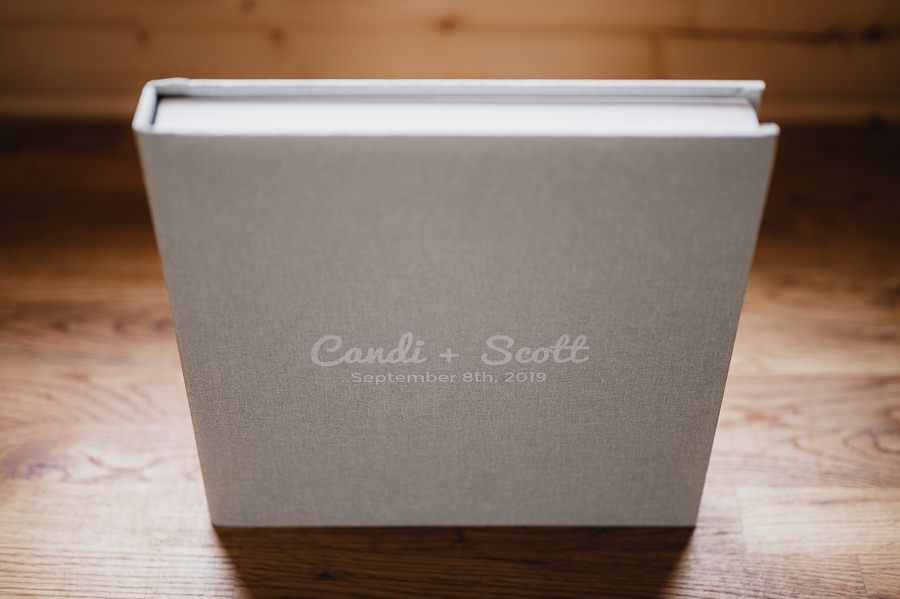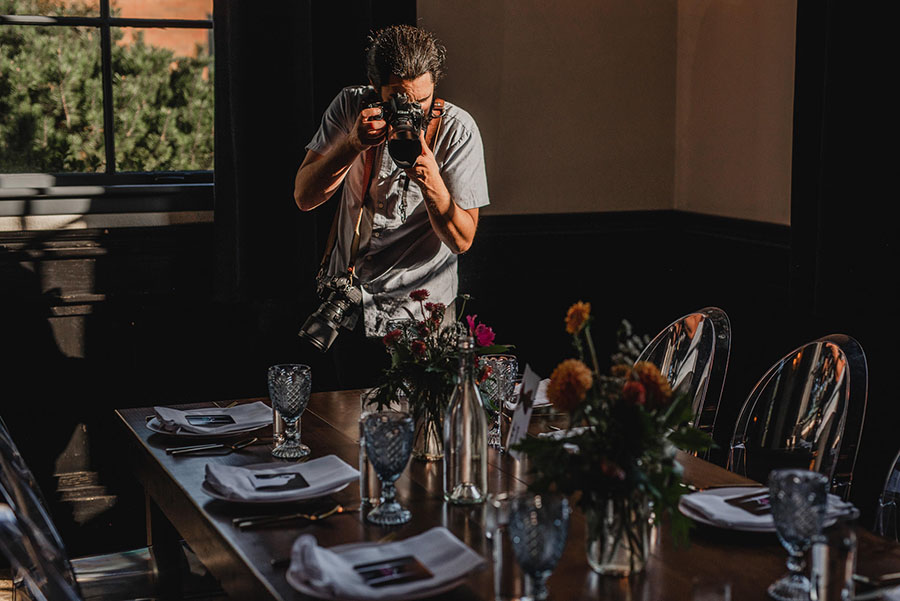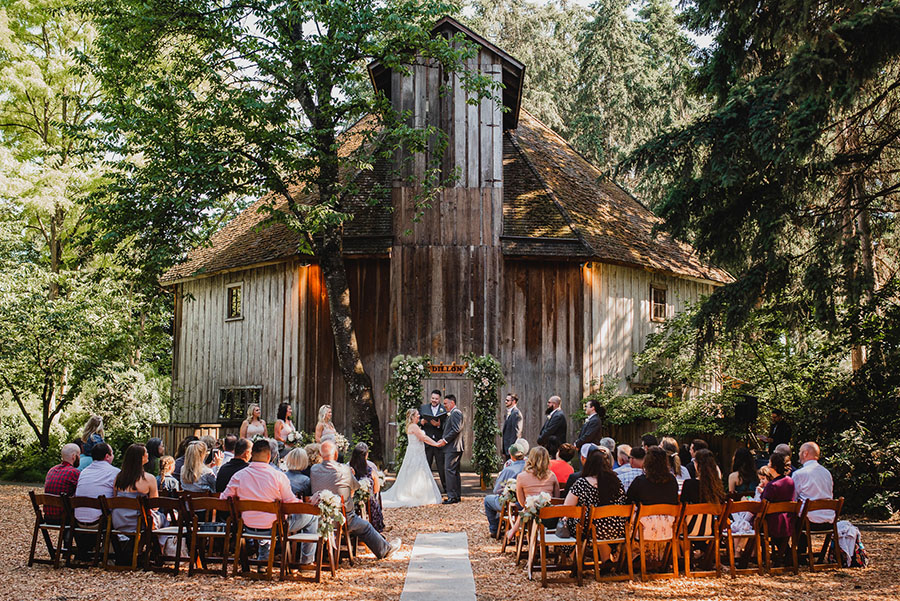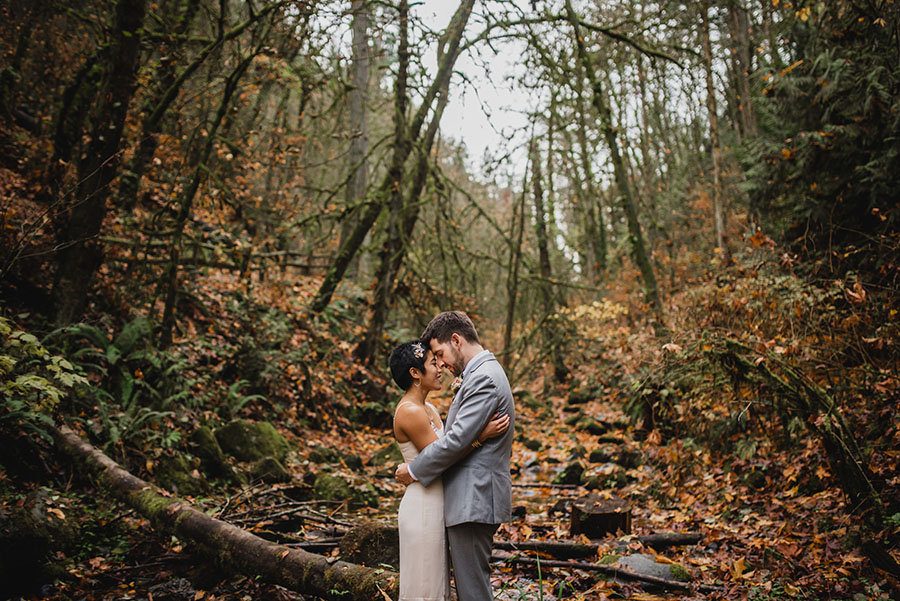Wedding days come and go, but photographs last a lifetime.
The expectation is that all the vendors you choose will work hard to turn your vision into reality. It is the photographer, in particular, who will document everything as it unfolds, in real time. More than any other person, (besides your partner of course), they are going to be up close and personal, so finding the right human for the job is critical.
For real, they are going to closely share each and every intimate moment, from getting dressed for the ceremony to driving off after the reception. While having those moments excellently captured is the end goal, there’s more to think about than just the photos themselves when selecting a wedding photographer.
The person you select should know how to be present in those moments without being seen and ultimately have the ability to give direction without taking away from the purpose of your day. All that to say, it is a good idea to get to know your photographer and what they have to offer before you decide to take the plunge.

First, What Should We Expect to be Included?
Before you dive into choosing a person to work with, there is some important groundwork to lay. From budget to location, there are many variables to consider.
Base Contracts & Pricing
It is common to find pricing pages on websites, however, others may need a little more info before they can give you a quote—especially the more customization needed.
Having a clear idea of the budget on your end is helpful for both you and your potential photographer, as it can establish a good parameter and help manage expectations from the start. Plus, this way, it’s a bit easier to give yourself a little extra wiggle room for things like an heirloom wedding album that might otherwise get missed.
Every professional has their own pricing structure and offerings, but there are some things that you can generally expect to be included in the base contract. The terms and pricing will change depending on the kind of event you want, elopement vs. full-scale wedding, and the location you choose.
Some pricing is structured by the hour with each item added a la carte, some are all package deals, and often you’ll see a hybrid of the two. It really depends on the specifics of your budget to determine what will work best for you.
Generally, you can count on the following being included in the base contract price:
- A consultation
- Timeline guidance and planning advice
- A specified number of hours
- Access to an online gallery
- A minimum number of photos
- Copyright license for your prints
- A portion of travel expenses
In addition to the base offerings, there are usually a variety of add-ons to consider as well. From heirloom albums to expedited photo delivery, what makes sense for each couple will look a little different. If you don’t see an a la carte list, inquire with the photographer to find out what is possible before you get serious, especially if there is something you have your heart set on (think photo booths with props).
Additional Costs and A La Carte Offerings
It makes sense that the number of people attending the wedding will affect the cost of the photo package you choose. Some of what goes into the overall costs can include things like a second photographer for larger events (100+ guests) or additional time. While well worth the expense, budgeting can help you be prepared to make decisions.
Considering the ever changing expectations surrounding weddings, the options to personalize them are endless. Your union doesn’t necessarily have to cost a fortune and finding someone flexible who can work with your ideas is priceless.
Elopement vs Full-Scale or Micro Wedding Expenses
The average elopement costs anywhere from $50 to $15,000 depending on the level of extravagance, with micro weddings costing about the same. Despite the fact most couples hosting smaller events end up spending a bit more on each guest and on highly curated details, they still end up spending about half of what couples hosting a full-scale wedding might, on average.
It’s still possible to go all out no matter the size of your wedding. For some, going small simply means having the flexibility to choose details that would otherwise be out of reach at a larger scale. For others, it means focusing on the people and experiences that most represent them and their connection. No matter the size of the affair, couples everywhere are adding more of themselves to their ceremonies.
Make Sure it’s a Match
From consulting on locations, vendors, or even the kind of adventure you choose to go on, your photographer is going to be an integral part of the planning process, especially if you’re eloping!
Narrowing down the list of who you’d like to work with starts with the following considerations:
Aesthetic: At the end of the day, photography is an artform, so does the artwork you are interested in match your aesthetic? Getting a feel for what most appeals to you before scheduling a consultation can be done by comparing the photos of many professionals via their websites.
Check out more than just the highlights, dig into their portfolio and ask yourself, “does their body of work match my vision for my wedding photos”? You want to fully trust you’re going to get what you want without having to micromanage your photographer or feel insecure about what’s happening during photo sessions.
Photography Approach: Beyond aesthetic, different photographers have different approaches to their work. Are you going to be more comfortable with someone who has a sense of urgency or someone more laid back? Someone with a natural design eye or a hyper-vigilant attention to detail?
Given the amount of time you are going to spend with them, you’ll want to make sure they’re someone you vibe with. Meet for a beverage, hang out, and talk about more than just the wedding and photos.
Availability: There are exceptions and cancellations, but most require booking well in advance. Unfortunately, this is not a choice you can often make last-minute, especially if you are attached to working with someone specific.
Many couples hire a photographer for their engagement photo sessions as a trial run and to have photos for their wedding day guest book. It’s also a great way to get to know their style and find out what it’s like to work with them.
Bonus, a professional photographer will have years of experience playing a major part in helping couples plan their weddings, and, let’s be honest, this is likely your first go around. Don’t be afraid to ask questions and find out what they know and how that can be of use to you. You bring the vision, they bring the experience.
What Skills Should Your Wedding Photographer Have?
Consider your photographer a resource and an advocate. They can help guide your timeline and make sure you get the exact shots you’re hoping for.
Full-Scale Weddings
Naturally, there are going to be specific considerations to be made when planning a full-scale wedding. An event of this kind usually hovers around 131 guests, this means many special moments are happening simultaneously.
Someone with significant experience is not only able to capture incredible photos, they will also be adept at prioritizing your specific requests while staying present to the special moments unfolding around them, but one person can only do so much.
It’s suggested to have a second photographer for larger weddings for this reason. It’s common for photographers to have relationships with other professionals who are familiar with their shooting style, making this an add-on that is well worth the investment. After all, you’ll want to see what you weren’t able to witness in the flurry of your big day.
Micro Weddings
The main difference between a full-scale and a micro wedding is the size of the guest list, with micro weddings usually only boasting 50 guests or fewer. Perhaps surprisingly though, smaller events can pose some unique challenges for the photographer. One of the most important jobs during a micro wedding is to blend into a very small crowd and maintain the ability to capture intimate moments without stealing the stage.
Scaling down typically means scaling up on the highly individualized and curated details. For some, that means over-the-top florals, custom gifts, or the reception dinner of their foodie dreams. Whatever you choose, you’ll want to remember it forever, so attention to detail is an important quality.
Lastly, with fewer people, your timeline can often be more flexible. With a smaller event you can have your choice of a wider variety of venues and include any and all of the activities that feel important to you.
Wilderness Adventure Elopements
Sure, adventure photographers will still provide and require the usual: a professional contract, pricing, and photo package options, but they also have planning advice mixed up with some great outdoor skills that are sure to take your wedding day to the extreme—in a good way. This means your photo session becomes a personalized adventure, meant to document your connection in the wild.
If you and your partner are sold on saying “I Do” from the trail, then you must find a photographer who identifies as an adventurer, themselves. The benefits extend well beyond simply being able to keep up, but also sharing your values. Such as stewarding the land responsibly so it can be enjoyed for years to come.
Are you in need of an adventure elopement photographer, or would an extreme-adventure photographer better fit your needs? There’s a big difference between joining you on a day hike and a multi-day backpacking trip. It’s helpful for everyone to have an idea of your expectations before meeting. Either option requires some level of skill and experience, so you’ll want to make sure you’re on the same page.
Most National, State, and City parks will require you to get a permit to camp or have your ceremony on public land. These are processes someone with experience is likely familiar with and can help you navigate.
When you are headed to the woods, to the desert, the beach, or any other outdoor locale to take epic photos, you want to work with a professional. And, if those pictures are being taken while on the trail, there is a clear advantage to working with someone who has the appropriate experience.
Making the Decision
There is a lot that goes into choosing the perfect person to photograph your wedding. Beyond pricing and availability there are considerations such as their personal aesthetic and quite frankly, personality. With all that in mind, you are primed and ready to make a good choice.
At the end of the day, looking at everything that goes into planning any wedding can be overwhelming, and exciting, and emotional, and all of the above. As the details take shape, it’s fulfilling to be able to bring this beautiful day with your partner into fruition, showcasing your love and affection for each other along with your creativity, values, and style.



